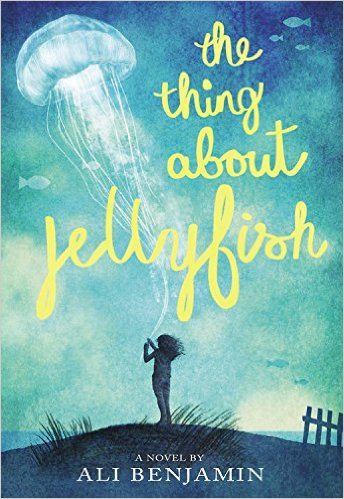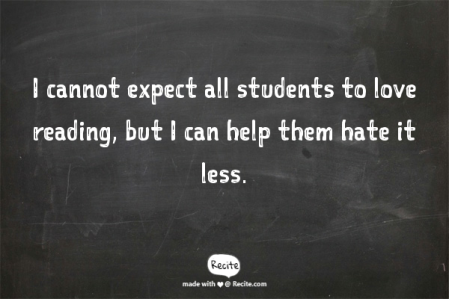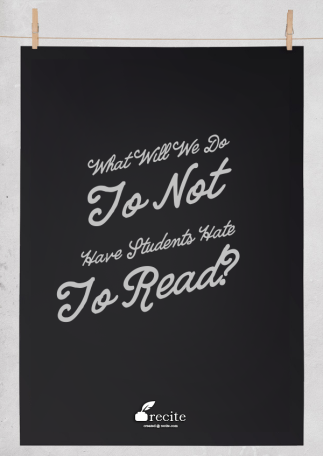Pernille Ripp's Blog, page 71
August 28, 2015
How I Select A Picture Book For Our Classroom
Yesterday a new student wandered into our classroom with his parent and younger siblings; locker drop off was happening in preparation for the first day of school. As I looked up something for him, I heard them excitedly talk about the books in our room. “Here’s that one that you wanted to read…Oh, do you remember this series….” And then they saw the picture books. After all, they are hard to miss. Right away the comments came, “Oh, I loved this one…” “Have you seen this one, that looks fun…” And so forth and I smiled ever so wide, because picture books once again have proven to be a way to connect in our classroom.
But how do you pick the right ones for your classroom? How do you know which ones to get? I make lists, as do many others, but how do I even know which to put on the list? I thought a few helpful tips may be in order.
I am connected. I am a proud member of the Nerdy Book Club and through Twitter I am connected to many picture book loving people; teachers, librarians, parents, and all of the other amazing people out there. I follow hashtags like #Titletalk, #pb10for10 and #nerdybookclub to stay in the know. And I tweet out asking for recommendations all of the time.
I keep a written list handy. I have a journal book with me at all times, and while I often add books to my wishlist on Amazon, I like having the list in my bag. I am always adding to it and will cross out as I either purchase or reject. This also makes it easy for me to recommend books to others that they may not know about.
I read them beforehand, most of the time. Many times we will wander to the nearest book store so that I can browse the books before purchasing them. How do I know that this will be a great one for our room, well there are few things I look for…
Do I react to it in any way? A picture book doesn’t always have to have a deep message for me to react to it; was it funny, did it make me think, did it leave me with questions? All of these are things that I look for.
Is it easy to follow? Sometimes it takes more than one read to really get a book and while I love those books too, most of the time, I am looking for a book that my students will get rather quickly. At least most of them. However, I do purchase picture books to use with smaller groups that have layers we can peel away.
Is the language accessible? Yes, I teach 7th graders but their reading development levels ranges from 2nd grade to high school, so can all students access the text or will I need to “translate” it?
What purpose does it have? I often look for picture books that can be used as community builders, self connections, or conversation starters. We also use them as mentor texts as we develop as readers and writers throughout the year. But I also look for picture books that will make my students laugh, make them reconnect with being a little kid again, or help them get out of a bad mood. I try to get a balance of all of these types of books in the hands of students.
Will we read it more than once? Because I buy most of the picture books in my classroom, I look for enduring books that we will return to again and again. Different things make books repeat reads; the illustrations, the phrasing, the story. Bottom-line: it is a gut feeling most of the time.
Do we have other works by the author? My students feel closely connected to the picture book authors and illustrators whose books we love so I try to expand our favorite collections as often as possible. Some of our favorites are Mo Willems, Peter H. Reynolds, Ame Dyckman, Jon Klassen, and Amy Krouse Rosenthal.
Sometimes I just take a chance on a book. Sometimes I have no rhyme or reason for what I bring in other than a small feeling that some kid at some point will connect with it. I never know which picture book my students will love, so sometimes I just sit back and let them explore and then pay closely attention. Then I go out and get more of those.
And, of course, I cannot write a post discussing picture books without sharing a few of my new favorites or ones that I cannot wait to get.
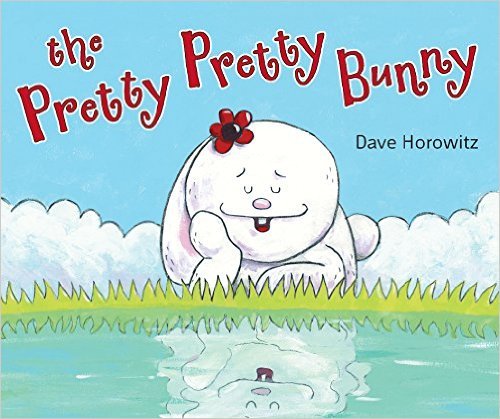
Laugh out loud funny, The Pretty, Pretty Bunny by Dave Horowitz is in my first day pile for kids to choose from.
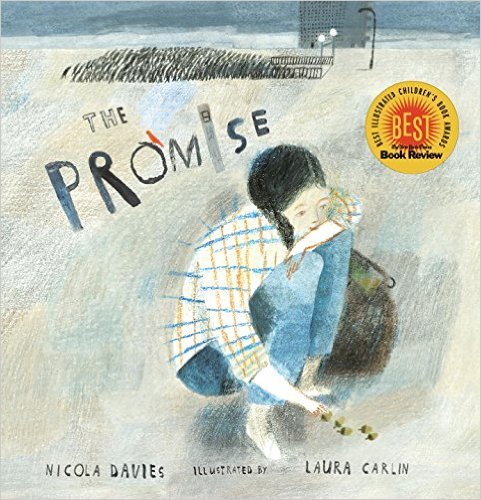
The Promise by Nicola Davies is a beautiful tale of making a difference. This would also be great for a science classroom.
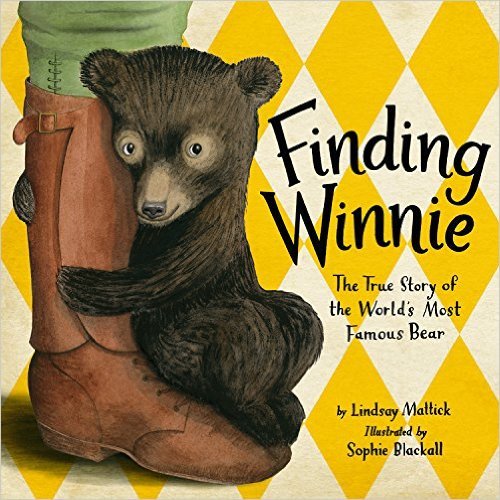
I cannot wait to get Finding Winnie – The True Story of the World’s Most Famous Bear by Lindsay Mattick. I wonder how many students will love this tale of the real Winnie the Pooh.
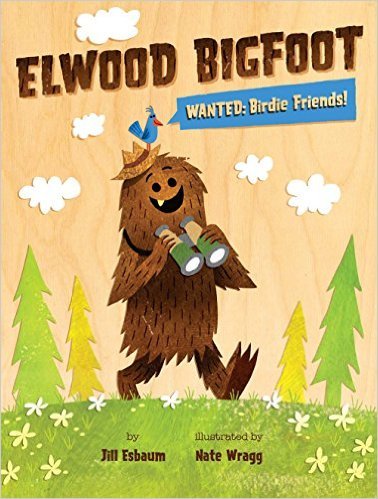
Why do I have a feeling that Elwood Bigfoot: Wanted: Birdie Friends by Jill Esbaum will become a favorite of my students?
Picture books are a part of our tapestry and something that I am proud we use in our middle school. I hope being vocal about the benefit of using picture books with older students will help others take the jump. I got to discuss more of this in this article here.
If you like what you read here, consider reading my book Passionate Learners – How to Engage and Empower Your Students. The 2nd edition and actual book-book (not just e-book!) comes out September 22nd from Routledge.
Filed under: being a teacher, books, community, inspiration, Literacy, Passion


August 26, 2015
What We Need to Remember
 image from icanread
image from icanreadThe words seem to fall off the pages as I scroll through their answers. The beginning seeds to what will become the kids that we will get to teach. They speak of hope, of dreams, and wishes. They speak of failures in the past, of words beyond their control, and actions they wish they could have protected their child from. Some merely say they hope for a good year, while others ask us to please love their child, that they could really use someone more who cares.
We take these children for granted. We take their dreams for granted. Their hopes. Their wishes. We have them speak but then do not always listen. We hurry so much at times in our urge to get to everything that we forget that we are not here to teach content, but here to teach children.
Yet the parents. The guardians. The ones that sit at home. They tell us to please remember. To please not forget, that that child we spoke of today in our meetings, that the child we mentioned to our families, that the child that kept us up thinking late last night, that child belongs to someone. That at one point that child was so loved that the world seemed to stop for a moment and everything else fell away. Even if life has changed by now.
So as we get ready for another year, please remember that we do not teach products. We do not teach neat little boxes that will follow our every direction. That we do not teach robots who will comply with our every whim. We teach human beings, with all of their laughter, with all of their joy, but also with all of their anger, their confusion, their restlessness, and their dreams of something better. Please don’t forget that.
Because from one parent to another. From one teacher to another. Sending your child to school and hoping that someone else will get them is one of the hardest things to do. It’s one of the biggest leaps we take. We hope with every inch of us that on that first day of school our child will come home with a smile on their face and not just talk about all of the great things they did but about how much they love their teacher. How much they cannot wait to go back.
We hold the power to the future, we cannot forget that. Even on our toughest day that child is someone else’s. That child has dreams. And that child needs us to love them. Even when they don’t love themselves.
If you like what you read here, consider reading my book Passionate Learners – How to Engage and Empower Your Students. The 2nd edition and actual book-book (not just e-book!) comes out September 22nd from Routledge.
Filed under: being a teacher, being me, hopes, new year, Student, teaching


August 25, 2015
My Favorite Reads of the Summer – Part 2
I have a week left of vacation; a week left to read as many books as possible. A week left to try to get through my ever growing to-be-read pile. This afternoon, I made a list for my best friend’s 7th grader of books he had to read, and I once again realized how lucky we are that we get to help students find amazing books. And how lucky we are that authors continue to write such incredible tales. So what are some more favorites from this summer?
Thanks to Netgalley I just finished reading the wonderful The Thing About Jellyfish by Ali Benjamin. I love the science woven into this thoughtful story about grief and trying to find your place in a world that seems hellbent on making it hard for you. This is a Global Read Aloud 2016 contender.
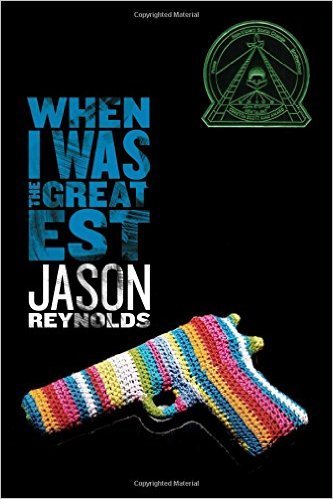
When I Was the Greatest by Jason Reynolds has been in my TBR pile for a long time, but since it had a gun on the cover in a way I had kind if dismissed the book as being suitable for my 7th grade classroom. Folks, do not let the cover stop you from reading this book, it is incredible, and do not let the cover stop you from adding this to your middle school classroom, you need to read it, discuss it, and then share it with students. The Boy in the Black Suit also by Jason Reynolds is another of my favorites and he is quickly becoming one of my favorite writers out there. This is another Global Read Aloud 2016 contender.
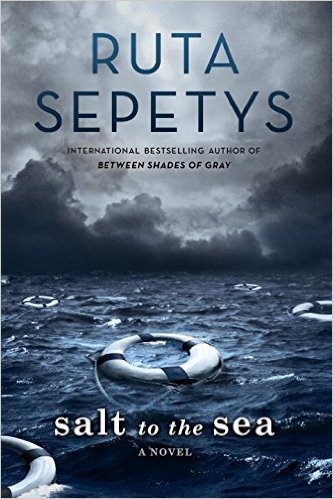
Ruta Sepetys is a master story teller who proved her staying power with Between Shades of Gray. She has done it again with Salt to the Sea. This historical fiction novel based on one of the largest maritime disasters during WWII is full of suspense as well as well-developed characters and a story that keeps you turning pages. Note, this book is for pre-order only right now, I was given an ARC at ILA.
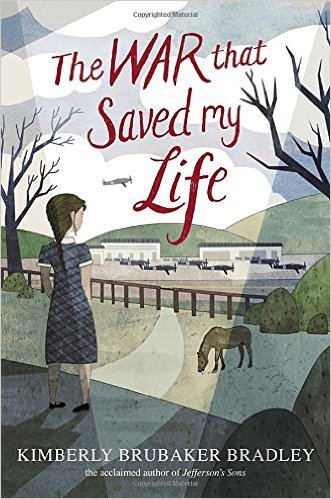
Another magnificent historical fiction novel about Ada and the seemingly impossible odds she is trying to overcome during the evacuation of children from London during WWII. The War that Saved My Life by Kimberly Brubaker Bradley is one to add to your classroom library from 4th grade and up.

Joelle Charbonneau, author of the great science fiction series The Testing, is back in full-force with this realistic fiction novel Need. This was a page turner of the truest kind, so much so that I stayed up into the night so I could finish reading it. Once again, this is more mature, and also only available for pre-order at the moment. Since I read it on Netgalley, I have already placed my pre-order, this will be a huge hit in November with my 7th graders.
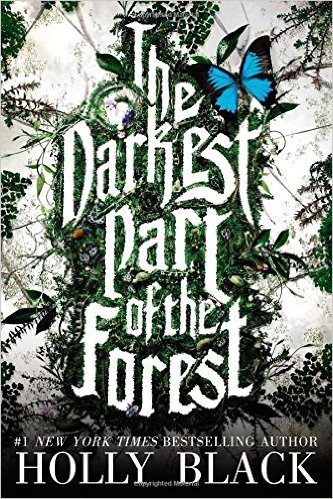
I have admire Holly Black’s vivid imagination ever since the incredible and terrifying The Coldest Girl in Coldtown. That is why I was surprised that it took me such a long time to read her newer one The Darkest Part of the Forest. It is so good, again, I read it one night. Scary and with some relationship stuff in it, but nothing too graphic, I had to read just one more page to see how it all would turn out. This is one of those books that makes you admire writers even more because how do they ever come up with such amazing ideas?
So there you have it for now. A few new favorites to add to your library, a few new favorites to share with students. Happy reading everyone!
If you like what you read here, consider reading my book Passionate Learners – How to Engage and Empower Your Students. The 2nd edition and actual book-book (not just e-book!) comes out September 22nd from Routledge.
Filed under: being a teacher, books, Literacy


August 24, 2015
6 Simple Things We Can Do to Make This A Better Year
8 days. 8 days and I get to do what I love the most outside of being with my own kids. 8 days and I get to finally meet those kids that will become “my” kids as the year progresses. 8 days and school starts again, and yes summer has been incredible, but the school year beckons and I cannot wait.
We get to teach the future of the world.
We get to protect the dreams of our students.
We are awash in positive thought as we start and there are a few things we can do stay that way.
Choose positive. I start every morning by plastering the biggest smile on my face. Every child (or adult) that I see deserves a smile and a greeting. Yes, it is exhausting at times, and yes, sometimes it is a fake smile, but you know what? Fake smiles still spread, and they are free, so if you want to be surrounded by positivity; smile.
Seek out new people. This is my second year in my building so I know a few people, but I also know there are new people joining us, so why not seek them out? We have all been the newbie wondering where we fit in and who we would get to know. Rather than wait for them to come to you, go to them and invite them to sit with you at lunch or meetings. Trust me, it makes a huge difference.
Try one new thing. Notice I didn’t say every day. Try one new thing, perhaps for a day, perhaps for a week, perhaps for a month, but push yourself intentionally. Find something new to try that makes you ever so slightly uncomfortable so that you do not become stagnant in your own professional development. Do something that makes you a little bit nervous so you can remember how it felt when you first started and everything felt like a risk.
Plan for fun. Plan for movement. Plan for speaking. Plan for listening. Plan for writing. All classes should have all of these every day, well almost all classes anyway. We cannot expect students to be enthusiastic about what we teach if we do not offer them chances to move, to speak, to listen, to write, and to have fun. And yes, having fun in school is not just something reserved for special days.
Stay realistic, not pessimistic. Yes, there will be days where everything goes wrong. There will be days where new ideas are introduced that seem to make no sense. There will be days where it feels as if the whole world is against you, we all have those days. Pick yourself up, dust yourself off, and focus on what went well. Allow yourself to dissect a situation and then move on. We are so quick to let outside factors determine how we feel, why give something like that any power. If you can’t control it, then focus on the things you can.
Do small acts of kindness. There are so many small things we can do that makes someone else’s lives easier and happier. I start the year by buying flowers for our secretaries and bringing donuts to our custodian. Thea’s teacher and busdriver get a small gift. I fill the copy paper (and clear the paper jams), hold doors, bring up mail to my teammates, and anything else that seems like it is no big deal to me, but it may be to others. I offer to cover classes when I can and I support when I have something valuable to give. That doesn’t mean I have less time to do my own things, it simply means that I care about other people. It is not hard to do either, but the payoff is amazing.
These ideas may not seem like much, but the intentionality with which we can go through our day is what makes a difference. Every day we make a choice of whether we want to make others have a great day or not. I know what I choose every single day, what do you choose?
If you like what you read here, consider reading my book Passionate Learners – How to Engage and Empower Your Students. The 2nd edition and actual book-book (not just e-book!) comes out September 22nd from Routledge.
Filed under: being a teacher, being me, choices, new year


It Soon Becomes A Reality
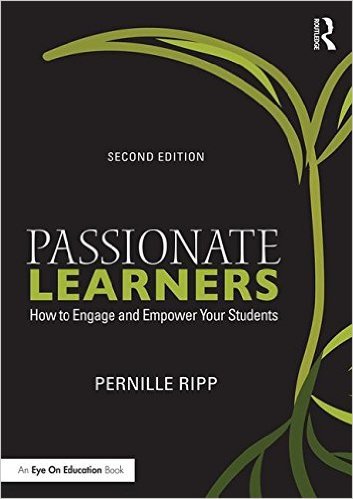
Yesterday was the 22nd of August, to us a rather milestone moment, but to the rest of the world probably not so much. You see yesterday marked the 1 month countdown to the publication of the 2nd edition of my first book Passionate Learners – How to Engage and Empower Your Students. And while I tend to not use this blog for self promotion, I am so proud of this book and what it might offer for others, that I am breaking my own rule today.
It seems weird to think that a book is a 2nd edition, but there is a very simple reason for it. The book is no longer owned by its original publishing company due to differing visions and Routledge purchased the rights. They saw something in the book that made them want to print it as an actual book, release it on Amazon, and market it to the world. Humbling…
But I didn’t want to just re-package it. I saw this as a chance to re-write it, to add my students voices even more, and to add what I had learned now being a middle school teacher. So it is not the same book any more, it is so much better.
This book is for those who need inspiration to change the way they teach. This book is for those who wonder whether you can really limit homework, limit grades, and get rid of punishment and rewards within our school system. This book is for those that feel they are doing pretty good as teachers but really need a boost, really need to bring the classroom back to the students again. This book is for those who like me were just fine teachers but knew there had to be a better way.
So in 1 month, I will get to hold my own book in my hands. I will get to give it to the world and hope the world responds. My greatest hope is that one person will read it and it will help them, that my words can make someone else’s life better. After all, isn’t that what we hope for in our classrooms every day?
PS: If you would like to preorder the book, please use this link.
Filed under: Be the change, being a teacher, being me, books, Passion


August 21, 2015
Confessions of a Dream Crusher

We call ourselves the dream makers, the curiosity protectors, the people who will change education from within. We see ourselves as open-minded, always willing to change, and always looking to do what is best for students. We come to school on those first few days with dreams spilling out of our arms. New ideas floating around our heads as we dream of the possibilities. As we eagerly embark on a new journey.
Yet a few weeks in and our arms seem to be empty. The dreams gone, reality set in, and we think, “Well, maybe next year will be the year we change education, maybe next year these dreams will work.”
We can blame politicians for crushing our dreams. Sometimes we can even blame administration. But more often than not the blame lies within our own communities, our own teams, and ourselves. After all, how quick are we to dismiss the dreams of others before we even hear them out? How often do we think that we know better than someone else? How often do we make it a point to share just why something will not work. Yet, we get upset when someone dares to tell us that our dream is impossible, that our idea will never work, but forget that we say those some words to others.
We are so quick to tsk tsk other people’s new ideas. We are so quick to jump in with our own opinions, to share our own better ideas. To not truly listen because in our minds we have already decided that that idea will never work. We are so quick to burst the fragile bubbles of hope that we all bring back at the beginning of a new year. As if bringing someone down to Earth is a good thing.
And we can blame society. We can blame standardized testing. We can blame the Common Core. Or we can take responsibility for how we speak to others. For how we judge. For how quickly we dismiss. We can stop crushing the dreams of others.
Schools starts in 10 days. I will not be a dream crusher anymore. I will not be the one that says that something cannot work. I will not be the one that discourages others. Instead, I will be the one that says, “How can I help?” What will you be?
If you like what you read here, consider reading my book Passionate Learners – How to Engage and Empower Your Students. The 2nd edition and actual book-book (not just e-book!) comes out September 22nd from Routledge.
Filed under: being a teacher, being me, community, new year, Passion


August 18, 2015
On Hating Reading
I have loved reading as many years as I have lived. Reading wove its threads throughout my life, from my mother reading aloud to me every night, to learning to read English books in the lap of my now-father, biking to our public library with a plastic bag empty waiting for the books that would fill it, and now passing my love on to my own children as they beg for just one more book, every single night.
I have brought my love of reading into the classroom, cementing that in this room we are all readers. We all spend time finding those books that will transform us. Finding those moments where we beg for just one more page, one more minute, and hope that the teacher will give it to us.
I love reading, but I do not ask all of my students to love reading. I do not expect them to fall as madly in love with reading as I have, because if I did then I would ask them to accept the identity I have shaped for myself. I would ask them to sometimes do something impossible.
Instead, I ask them to like it more. To give it another chance, even if their hatred has been cemented in years of torturous reading experiences. I make them promise me to give it a chance, a proper one, to keep their minds open as we grow throughout the year. There are some students who will never love reading. Who will never feel like reading is the one thing they must do every day to sustain their souls. And yes, that makes me sad, but I also need to make sure that our classroom welcomes all students. Even those that identify as reading haters.
So we should carry our torch for the love of reading wherever we go. We should exude passion. We should help each child believe that they are readers. That books are for them. That they too can immerse themselves in something so deeply that they almost forget to breathe. Yet, I must remember, that if I tell a child that they must love reading, some children will rebel simply on principal. Some children will find every reason to hate it more. So I do not assume that all children will love reading. I assume instead that within our short time together, I can make them hate it less. I can change their minds, if even just a little bit. After all, our classrooms are created by the true personalities of our students. We must meet them where they are and help them grow on their journey.
I will never stop loving reading. I will never stop telling my students that they are readers every single day. Even those that don’t believe they are. I will never stop sharing my own love of reading, but I will allow students to figure out where their emotions fall and then help them move from there. I will see my students for who they are, even if they do not love reading. Even if I will never understand how you cannot.
If you like what you read here, consider reading my book Passionate Learners – How to Engage and Empower Your Students. The 2nd edition and actual book-book (not just e-book!) comes out September 22nd from Routledge.
Filed under: being a teacher, being me, books, Literacy, Passion, student choice


August 16, 2015
The Small Changes I Can Make
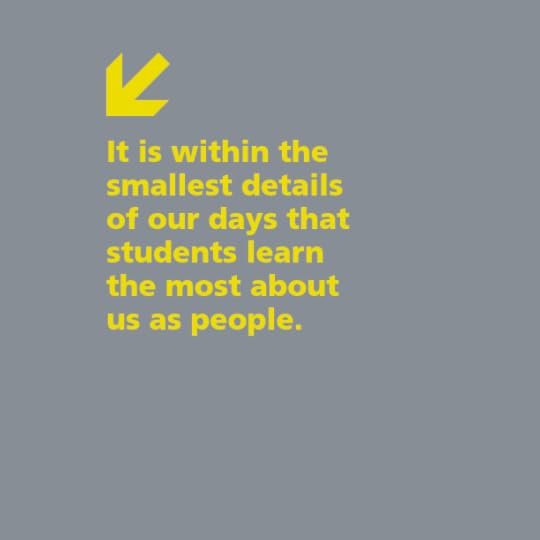
Sometimes our students come to us with stories that we could never imagine. Sometimes we are their refuge. Sometimes, we don’t even know what part we play until years later, and sometimes we will never know. The barriers that sometimes surround our students can be brutal, and yet, the students show up. They try to learn. They try to do their very best. And we need to be the ones that welcome them.
So this will be the year that I try not to create more barriers for my students. This will be the year where I try to make it as easy as possible for them to access the learning . While I cannot control everything, particularly what goes on outside of our classroom, there are so many small things I can control that will make their day easier.
I can hand them pencils. I used to be a tentative pencil-hander-outer. There was usually a lecture involved, a smirk, and some sort of thinly veiled threat as to what would happen if they didn’t get more pencils by the very next day. And I get it. Pencils cost money and we don’t have a lot of that in education. But still, a pencil is the most basic tool that our students need. And yes, they need to bring their supplies. Yes, they need to be responsible. Yes, they need to come prepared. But we all have days where we need a pencil. Not a lecture, not a glare. Just a pencil so we can get to work. If you want it back, write your name on a piece of paper and tape it to it.
I can withhold judgment. Yes, I know better than most of my students. I better, after all, I am more than 20 years older than them. So when they make “stupid” mistakes, when they make a poor decision, I can withhold my own judgment. I can help them find a solution, help them find the light, or even find the humor in a situation. Most students face enough judgment in day, they don’t need more from me.
I can let them leave. There are days when all we need is a walk. A quick two minutes to resettle, to find room to breathe, to calm down even if we seem very calm on the outside. Teaching students to recognize when they need a break is something we should all be doing. If we teach younger students then finding a way for them to take a break safely is also important, even if they cannot leave the classroom on their own.
I can make it easy for them. I can write the date, I can write out homework, I can post my email address on the wall. I can make as many visual reminders as I can fit onto a board so that they can access it without asking. I can also create a website with all of the handouts, resources, and information they need to stay organized outside of school. That doesn’t mean they won’t pay attention in class.
I can welcome them. Even when it is inconvenient, even when I am busy. Just because a child seeks us out does not mean they need us to speak with them. On our team we often have students ask if they can simply work in our room. Yes! Please do, let me know if you need anything. Sometimes all a child needs to be successful is a safe place to work. If we cannot offer up our rooms, we often find another place.
I can ask a follow up question. On our team, we teach more than 120 students. Every day, we stand outside our doors and ask students how they are, how their evening was, how they are feeling. When a child answers, we ask a follow up question because it’s the second question that matters. That’s the one that shows we care, that’s the one that shows we are paying attention. Anyone can ask “How are you?,” but it takes time to say more.
The barriers we create in our rooms are often ones that we don’t even notice, yet it is within the smallest details of our days that students learn the most about us as people. It is when we take time to do the little things that we can make a huge difference. What are the small changes you will make?
If you like what you read here, consider reading my book Passionate Learners – How to Engage and Empower Your Students. The 2nd edition and actual book-book (not just e-book!) comes out September 22nd from Routledge.
Filed under: aha moment, Be the change, being a teacher, new year, students


August 15, 2015
Some of My Favorite Historical Fiction Books Right Now
I just finished Ruta Sepetys’ new book Salt to the Sea which I received as an ARC at ILA. It was amazing. As I poured over the historical notes in the book, I marveled at the dedication and know-how that it takes to create a masterful historical fiction book, and Ruta Sepetys is a master at it. I know that some of my students live and breathe for historical fiction and therefore thought a list of some of my favorite historical fiction chapter books would only be in order.

I have to start with the book that made me want to make this list; Salt to the Sea by Ruta Sepetys. This book is a masterpiece, told in multiple perspectives and once again taking a little known event and giving it its proper place in history telling the tale of one of the largest maritime disasters in history that happened in 1945. The only unfortunate part is that this book is not released until February, 2016, but do yourself a favor and pre-order it now. I just did.
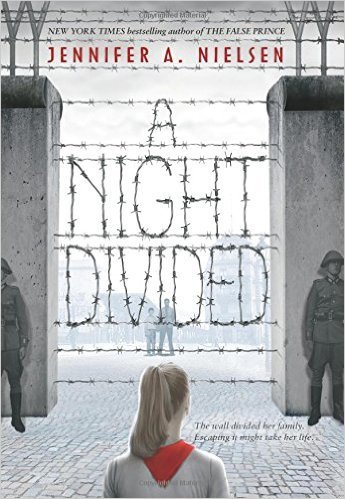 Ever since The False Prince, Jennifer A. Nielsen has been one of my favorite authors, so I was terribly excited when I read her new historical fiction novel A Night Divided about a young girl and her brother trying to reunite with their father in a divided Berlin. This book was a page turner and also offered an incredible glimpse of what life was like in East Berlin.
Ever since The False Prince, Jennifer A. Nielsen has been one of my favorite authors, so I was terribly excited when I read her new historical fiction novel A Night Divided about a young girl and her brother trying to reunite with their father in a divided Berlin. This book was a page turner and also offered an incredible glimpse of what life was like in East Berlin.
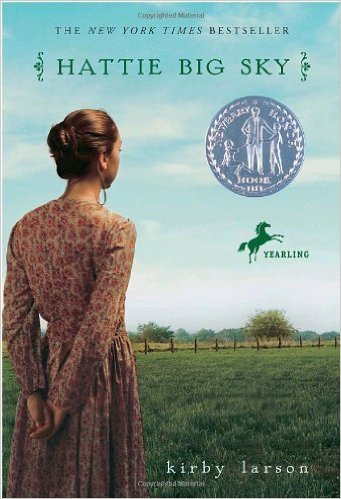
I have loved Hattie Big Sky by Kirby Larson for a few years, trying to pass it into the hands of as many students as possible. The story follows Hattie as she tries to prove up on her uncle’s homesteading claim. There was so much I didn’t know about the trials and tribulations of this time, I am so glad I read this book to teach me.
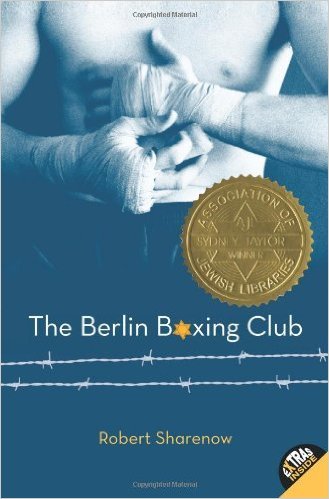
Although intended for a more mature reader, I did have a copy of The Berlin Boxing Club by Robert Sharenow in my 5th grade library. This loose interpretation of the famous German Boxer Max Schmeling’s experiences after KristallNacht is one that a student declared the best book he had ever read. I don’t think I can give it a bigger recommendation than that.

Is it awful to admit that the reason it took me so long to read the incredible The War that Saved My Life by Kimberly Brubaker Bradley was because I didn’t like the cover? Oh when will I ever learn? This book is an amazing account of what it felt like to be a child in London during WWII and especially the children that were transported to the countryside to live with strangers for protection. A must add.
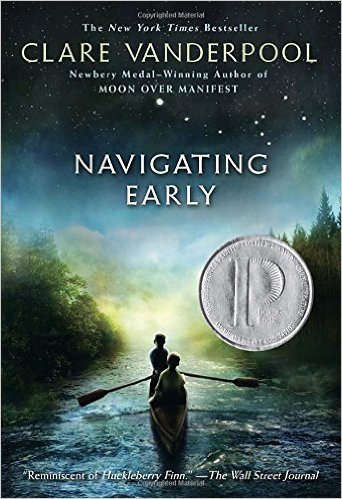
Navigating Early by Clare Vanderpool is a quirky book that grows on you as you as you read it. Students tend to not pick this one up by themselves, but once I have book talked it , it always finds it home with “that” kid that falls deeply in love with it.
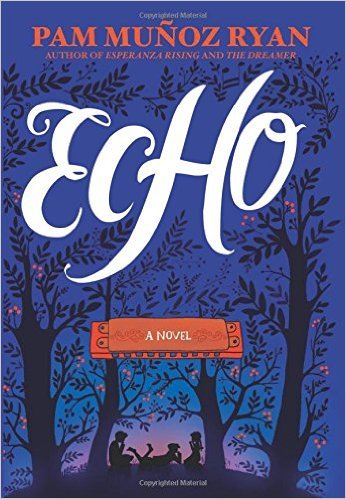
I had the distinct honor of seeing Pam Munoz Ryan speak, and even play the harmonica, at ILA this summer and it only strengthened my belief that she is a genius. Echo, her latest book, is a masterpiece with three seemingly different stories woven together perfectly all surrounding WWII but in three very different places. I cannot wait to hand this to as many students as possible.
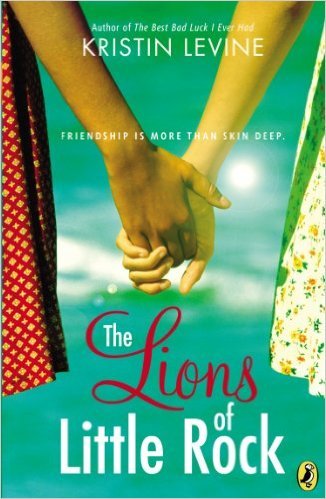
The Lions of Little Rock by Kristin Levine was a Global Read Aloud finalist, need I say more? With its tale of two girls becoming friends in segregated Little Rock, I felt like I held my breath until the end of the story. I have used this for book clubs as well with much success.
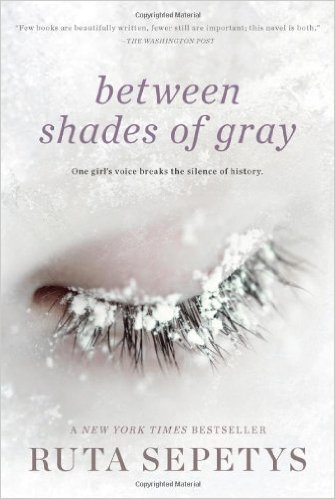
It seems only fitting that I end with another Ruta Sepetys book Between Shades of Gray. A remarkable book that details the forcible relocation of Lithuanians that happened during WWII. Books like this are the reason historical fiction is so important to have for students.
I purposefully am trying to highlight newer books to me, but please do not forget about these amazing books as well that have already stood the test of time. Some of these include
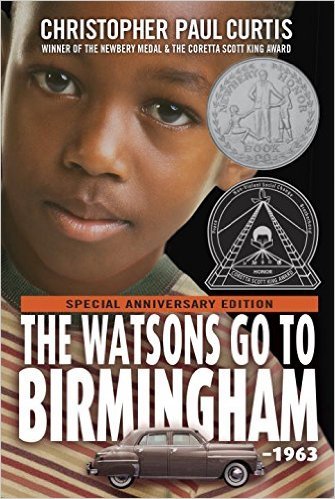
The Watson’s Go to Birmingham- 1963 by Christopher Paul Curtis.
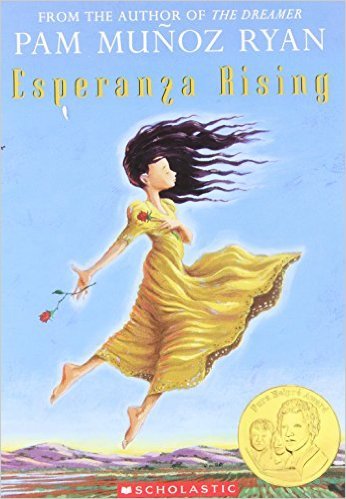
Esperanza Rising by Pam Munoz Ryan
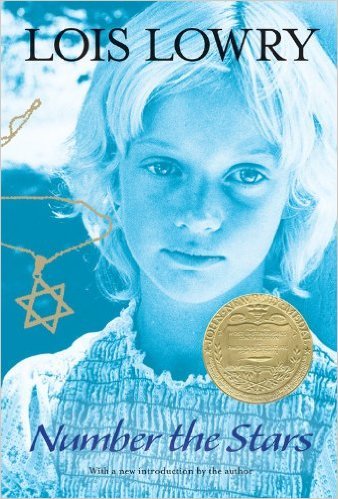
I actually have a bit of hard time with Number the Stars by Lois Lowry. Being born and raised in Denmark and having a grandfather that was a resistance fighter during the war, this book has taken something very hard in my country’s history and packaged it a little bit too neatly. However, it does give a taste of what Denmark was like during WWII, but certainly not the full story. If you have more mature readers, have them read The Boys Who Challenged Hitler by Phillip Moose. That will give a much more comprehensive and astounding look at what really happened during World War II in Denmark.

So which ones have I forgotten?
If you like what you read here, consider reading my book Passionate Learners – How to Engage and Empower Your Students. The 2nd edition and actual book-book (not just e-book!) comes out September 22nd from Routledge.
Filed under: books, Literacy, Reading


August 13, 2015
At Any Given Moment We Have the Power to Stop the Hatred of Reading
It used to astound me that my 4th graders would come to me and profess a hatred of reading. It used to shock me to the core. After all, these were the same kids that would ask for just one more page of our read aloud. Who would ask me to read a picture book aloud the minute it came to our room. Who had no problem confessing the love for the book we were sharing, but had none for the one they were reading alone. I always thought that the next year’s teacher would surely get them on the right path even if I couldn’t.
Now I am the next year’s teacher, and their dismay of books has only grown further. The group of children telling me that they never read outside of school has only grown. And this is not a boy-reader problem, this is an any gender problem. This is not something just caused by poverty, nor disengaged parents, nor reading difficulties. I see the hatred of reading defended the most from my students who have had every opportunity to fall in love with reading. I know I am not alone in this. And I know I cannot wait for someone else to fix it.
So I started to dig a little deeper. I get that they “hate” reading, but why? What parts was it that caused so much emotion, or sometimes so little, that students would have a physical reaction to whenever we had independent reading time. And their truths were not pretty, because the finger they pointed, pointed right at me. Or us, as educators.
We may think that it is too easy to blame teachers for the systematic destruction of reading love in our schools, and it is, because there are forces beyond our control that have a huge part in this as well. But part of the blame does lie with us, and that means we can do something about it. Especially in the upper grades where reading is no longer treated as something magical, but instead merely something useful.
At any given moment, we have the power to stop ourselves from telling students what to read. In our eagerness to shape well-rounded readers we are instead creating non-readers. In our eagerness to make sure students are exposed to all types of books, we are limiting them from discovering their own reading identity. Would we rather have a child that reads every single fantasy book they can come across, or a child that begrudgingly only reads a few books a year from other genres?
At any given moment, we have the power to make reading fun again. Fun is a not a swear word in our schools. There is nothing wrong with discovering a book that makes us laugh, or makes us wonder, or makes us think. Reading does not always have to have a purpose. It can be just to share a wonderful experience.
At any given moment, we have the power to stop interrupting children while we read. To not point out every single detail. To not have them do post-its for every thought they have. To not have them turn-and-talk every few minutes. Let them reach the reading zone as Nancie Atwell calls it. And not just once in a while but most of the time.
At any given moment, we have the power to reclaim what reading should feel like in our classrooms. To stop always using whole-class novels. To stop furthering our own vision for what makes a reader a reader. To stop hanging our own reading identities around the shoulders of students and wonder why it does not fit?
At any given moment, we have the power to create classrooms where reading is magical. Where reading is celebrated. Where reading is taught, but taught in a way that does not extinguish the love of the very thing we are trying to promote. But we have to look at our own practices first, we have to stand up and change. We have to ask our students what we are doing so that we can be better. So that their love of reading does not have to survive our classrooms. So that their hatred for reading does not have room to grow. But it starts with us, not them.
If you like what you read here, consider reading my book Passionate Learners – How to Engage and Empower Your Students. The 2nd edition and actual book-book (not just e-book!) comes out September 22nd from Routledge.
Filed under: being me, Literacy, Passion, Reading, student voice



